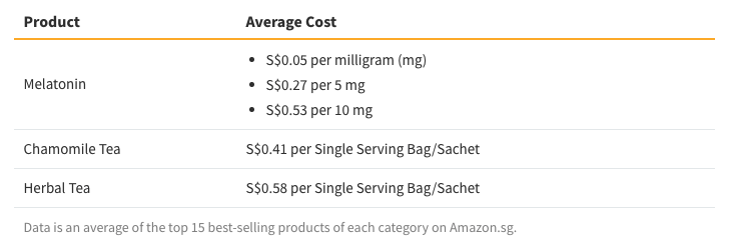Singapore is one of the most sleep-deprived countries in the world. On average, Singaporeans sleep 36.23 minutes under the recommended eight hours per night—the lowest average amount of sleep of any country. Since the onset of the COVID-19 pandemic, quality of sleep has taken another turn for the worse. 6 in 10 Singaporeans have reported declining sleep quality due to stress, mental and emotional health, and work routines affected by the pandemic.
However, as the pandemic rages on and remote work becomes increasingly normalised, Singaporeans must adapt to the "new normal." If this applies to you, there are many things you can do. The following budget-friendly hacks can immediately improve your quality of sleep at almost no cost to your savings:
Try a Natural Sleeping Aid Such as Decaffeinated Tea
If you aren't currently using some sort of sleeping aid, we understand. It isn't ideal to take dietary supplements every time you want a good night's sleep. Some worry that extensive use of products such as melatonin can contribute to adverse effects on your health. Furthermore, consistently using such products can increase unneeded expenses in the long run.
Fortunately, decaffeinated teas are a cheap and natural alternative to sleeping aid pills. Instead of taking medication solely to fall asleep, you can make a cup or pot of tea at a comparable price. For the price of one tea bag, you can accomplish two birds with one stone by enjoying a soothing beverage while preparing your body for a good night's rest.
For your convenience, the table above illustrates the cost of Melatonin compared to the most popular decaffeinated teas known to positively affect sleep quality.
Limit Sensory Stimuli
Exposure to excessive sensory stimuli can be very detrimental to your quality of sleep. In an urban jungle like Singapore, it's important to limit light pollution at night. You can accomplish this by installing curtains or shades that can block out most light from your window. As a budget-friendly alternative, you can also try using an eye mask to cover your eyes when sleeping.
Outside of excess light, noise pollution is another hurdle preventing some Singaporeans from achieving more fulfilling sleep. Although investing in a white noise machine can help eliminate some city sounds, there are several other ways you can effectively block noise at little to no cost. If you prefer absolute silence when you sleep, consider trying to sleep with earplugs. Alternatively, you can play nature sounds or white noise(s) from your mobile phone, computer, and/or speaker to avoid purchasing a noise machine.
The following table shows the average cost of recommended products for sleep aid and their budget-friendly alternatives:
Try Keeping Your Mobile Phone Away From You
There are several reasons why using your mobile phone before bed can be detrimental to your quality of sleep. Consuming media via your mobile phone keeps your brain activated, which is contrary to the state of rest required to fall asleep. Likewise, the blue light emitted by your mobile phone's screen is damaging to your eyes and your natural melatonin levels.
Singaporeans trying to improve their quality of sleep should consider their mobile phone use and placement. If you find yourself distracted from sleep by your mobile phone, try moving it to a different location further away from your bed. If you normally use your smartphone as an alarm clock, try to purchase a separate alarm clock to limit your screen exposure. If you choose to keep your phone away from your bed while using its alarm functions, getting up to turn off your alarm can help you wake up more promptly.
Learn Your Optimal Sleeping Positions
Contrary to popular belief, achieving an optimal sleeping position does not require purchasing a top-of-the-line mattress or posture-fitting pillows. Even though there are certainly ways to save when shopping for such products, there is no universal product or position that will work for everyone. For this reason, you're better off experimenting with different sleeping positions to find your own optimised body position.
If you are used to sleeping on your side, consider making adjustments based on your body's comfort or discomfort. For instance, those who sleep in a fetal position may experience less joint pain or stiffness if they loosen up their posture. Alternatively, those who frequently snore or experience heartburn or acid reflux may benefit from adding an additional pillow to rest under the head or neck.
There are countless ways that you can adjust your sleeping position depending on your personal circumstances. Of course, these adjustments can range from very general to very granular. It is recommended that you devote some time to figure out your own best practices for better sleep, and then challenge yourself to apply these practices every night.
This guest post is contributed by Seaton Huang, Junior Research Analyst, ValueChampion Singapore

